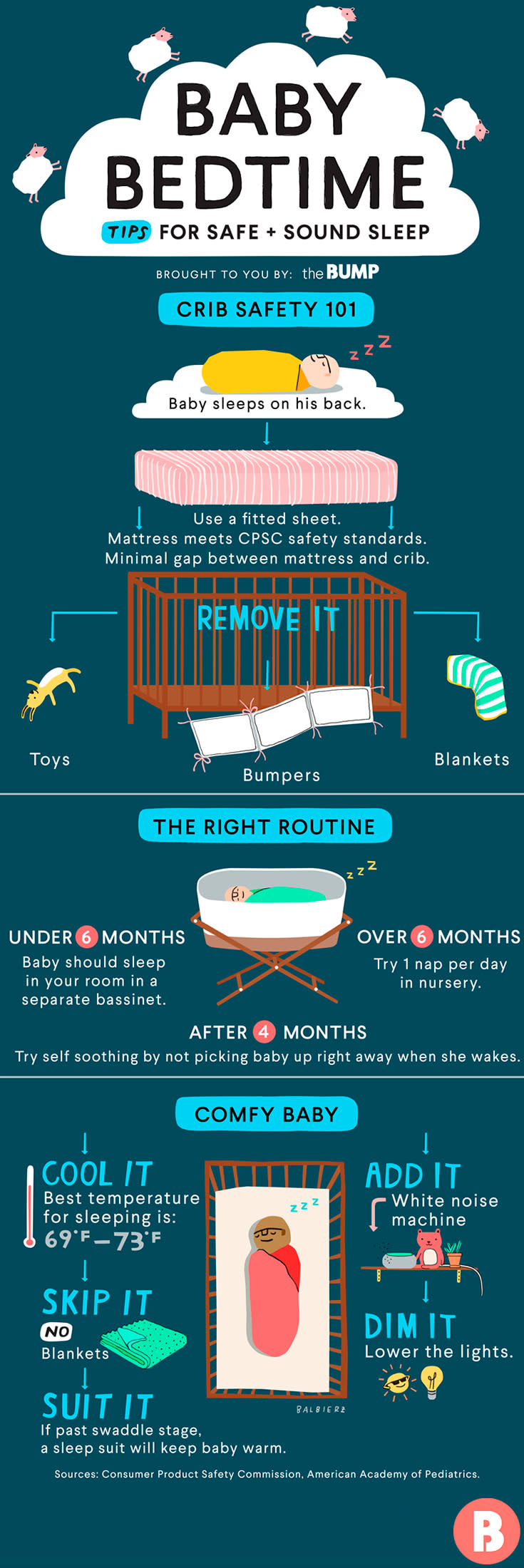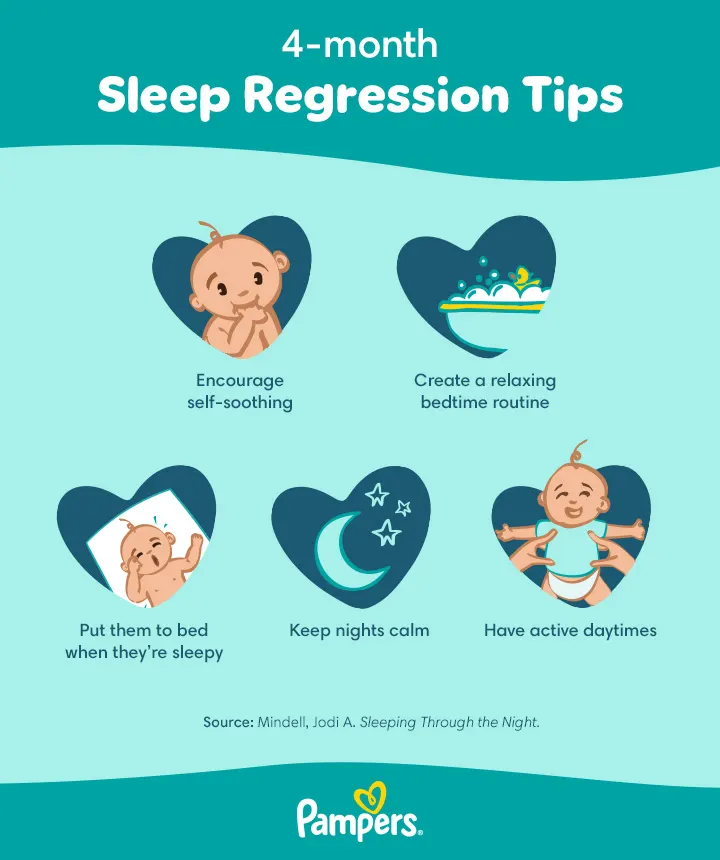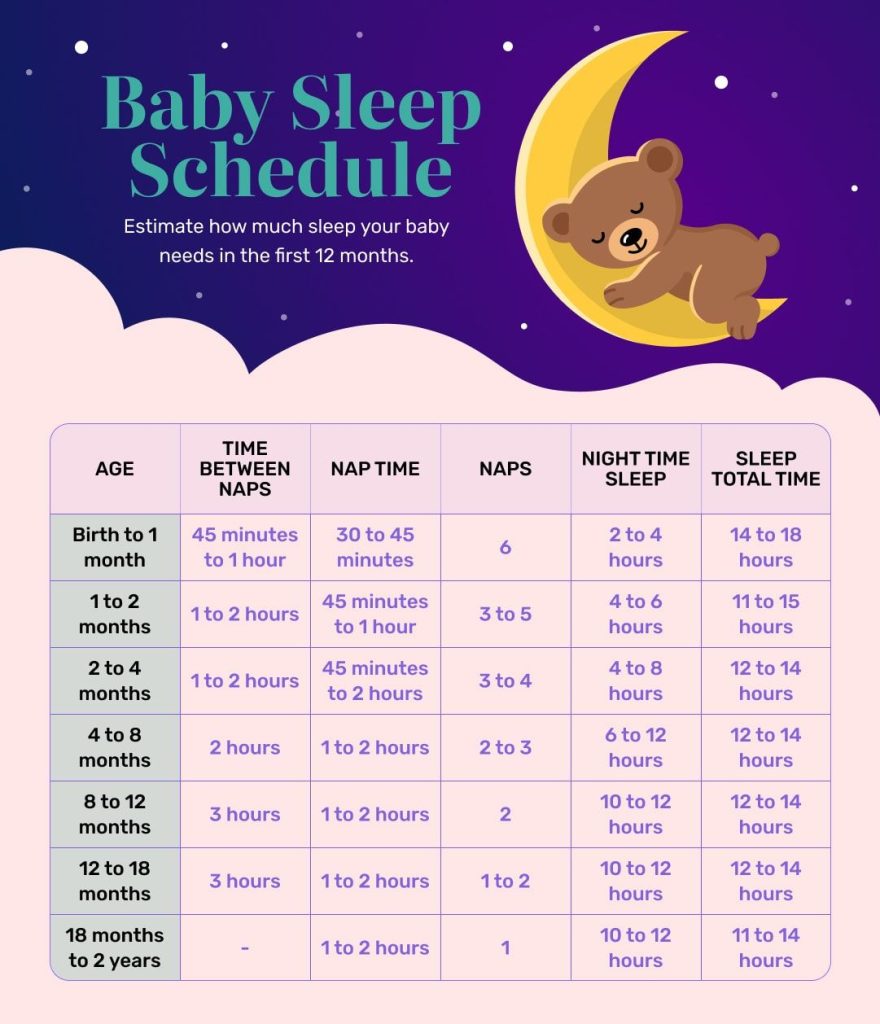Establish a consistent bedtime routine and create a calm, sleep-friendly environment. Ensure your baby is comfortable and well-fed.
Helping your baby sleep through the night can be challenging for many parents. Establishing a consistent bedtime routine is crucial. This might include a bath, reading a story, or gentle rocking. A calm, sleep-friendly environment also aids in better sleep.
Ensure the room is dark, quiet, and at a comfortable temperature. Feeding your baby well before bedtime can prevent night wakings due to hunger. Avoid stimulating activities close to bedtime. Consistency and patience are key to helping your baby develop healthy sleep habits. By following these steps, you can create a peaceful night for both you and your baby.

Credit: www.pregnancybirthbaby.org.au
Establish A Bedtime Routine
Helping your baby sleep through the night can be challenging. Establishing a bedtime routine is essential. A consistent and calming routine can signal to your baby that it’s time to sleep. This section covers the importance of consistency and how to create a calming environment.
Importance Of Consistency
Consistency is key to a successful bedtime routine. Babies thrive on routines. A predictable schedule helps them feel secure.
- Set a specific bedtime each night.
- Follow the same steps in the same order.
- Keep the routine short and simple.
Consistency makes it easier for your baby to know what comes next. They will understand it’s time to wind down and sleep.
Creating A Calming Environment
Creating a calming environment can help your baby relax. A peaceful setting can make it easier for them to fall asleep.
| Tip | Description |
|---|---|
| Dim the lights | Lowering the light signals that it’s time to sleep. |
| Reduce noise | Keep the room quiet to avoid startling your baby. |
| Comfortable temperature | Ensure the room is neither too hot nor too cold. |
Incorporate calming activities in the routine:
- Give a warm bath.
- Read a short story.
- Singing a lullaby.
Calming activities help signal that it’s time to sleep. Keep them quiet and soothing. Avoid stimulating activities before bed.

Credit: www.childsfarm.com
Optimal Sleep Environment
Creating an optimal sleep environment is key to helping your baby sleep through the night. The right setting can make a significant difference in the quality of your baby’s sleep. This section will guide you on how to set up the perfect sleep environment for your baby.
Room Temperature
The room temperature should be just right. A room that is too hot or too cold can disrupt your baby’s sleep. The ideal temperature is between 68-72°F (20-22°C).
Use a thermostat to monitor the room’s temperature. You can also use a room thermometer. Dress your baby in light sleepwear and use a sleep sack if needed.
| Temperature (°F) | Temperature (°C) | Recommendations |
|---|---|---|
| Below 68 | Below 20 | Use a blanket or sleep sack |
| 68-72 | 20-22 | Ideal temperature |
| Above 72 | Above 22 | Dress in light clothing |
Noise Control
Noise control is crucial for a baby’s sleep. Babies are sensitive to sudden noises. Keeping the room quiet can help your baby sleep better.
Use a white noise machine to mask sudden sounds. Soft music can also be soothing. Ensure the volume is low and consistent.
- White noise machines
- Soft music
- Soundproof curtains
Avoid loud activities near the baby’s room. This helps maintain a calm environment. Consistent noise levels can make a big difference.
Feeding Strategies
Ensuring your baby gets enough sleep is vital for their growth. Feeding strategies play a crucial role in achieving this. The right feeding routine can help your baby sleep longer and more soundly. Let’s explore some effective feeding strategies.
Timing Of Last Feed
Feeding your baby at the right time is essential. Aim to give the last feed about 30 minutes before bedtime. This helps the baby feel full and comfortable. If your baby is older, consider a small snack before bed. This ensures they have enough energy to sleep through the night.
- Feed the baby 30 minutes before bedtime.
- For older babies, include a small snack.
Keeping a consistent schedule can also help. Babies thrive on routines. The more regular the feeding time, the better they sleep.
| Age | Feeding Time |
|---|---|
| 0-3 months | 30 minutes before bed |
| 4-6 months | 45 minutes before bed |
| 6+ months | 1 hour before bed |
Avoiding Overfeeding
Overfeeding can make babies uncomfortable. This can disrupt their sleep. To avoid this, ensure they eat the right amount. Observe signs of fullness. These can include turning the head away or closing the mouth.
Here are some tips to avoid overfeeding:
- Feed smaller amounts more frequently.
- Watch for signs of fullness.
- Do not force the baby to finish the bottle.
Keeping track of how much your baby eats can also help. This ensures they get enough, but not too much. A balanced feeding routine promotes better sleep.
Swaddling Techniques
Swaddling can be a game changer for helping your baby sleep through the night. This technique mimics the snug environment of the womb, providing comfort and security. Let’s explore some effective swaddling techniques to ensure your baby sleeps soundly.
Benefits Of Swaddling
Swaddling offers several benefits that can help your baby sleep better.
- Reduces the startle reflex
- Keeps your baby warm without loose blankets
- Provides a sense of security
Safe Swaddling Tips
Follow these safe swaddling tips to ensure your baby’s safety and comfort.
| Tip | Details |
|---|---|
| Use a lightweight blanket | Avoid overheating by using breathable fabric. |
| Leave room for hips | Ensure the hips can move freely to prevent hip dysplasia. |
| Keep the neck clear | Ensure the swaddle is not too tight around the neck. |
Effective Swaddling Techniques
Here are some effective techniques to swaddle your baby:
- Diamond Swaddle: Lay the blanket in a diamond shape. Fold the top corner down. Place the baby on the blanket, with shoulders just below the fold.
- Square Swaddle: Lay the blanket square. Fold one corner down. Place the baby so their shoulders line up with the fold.
- Winged Swaddle: Lay the blanket flat. Fold the top corner down. Place the baby with their shoulders aligned with the fold.
Remember, practice makes perfect. Swaddling can be tricky at first, but with practice, you’ll get the hang of it.
White Noise Machines
Helping your baby sleep through the night can be challenging. One effective tool is a white noise machine. These machines produce soothing sounds that can mask disruptive noises. Let’s explore how white noise machines can help your baby sleep better.
Types Of White Noise
White noise machines come in various types. Understanding these can help you choose the best one for your baby.
- Mechanical White Noise Machines: These use a fan to produce white noise.
- Digital White Noise Machines: These generate white noise electronically.
- Smart White Noise Machines: These are controlled via a smartphone app.
- Portable White Noise Machines: These are battery-operated and travel-friendly.
Pros And Cons
White noise machines have their advantages and disadvantages. Weighing these can help you make an informed decision.
| Pros | Cons |
|---|---|
| Masks environmental noise | Can become a sleep dependency |
| Provides a consistent sleep environment | May be costly |
| Portable options available | Requires power source |
| Helps establish a sleep routine | Not all babies respond to it |
Choosing the right white noise machine can make a big difference. It can help your baby sleep through the night by creating a calm and consistent environment.

Credit: www.thebump.com
Recognizing Sleep Cues
Understanding your baby’s sleep cues can help them sleep better. Recognizing these cues allows you to respond promptly. This can make bedtime smoother and stress-free.
Common Signs Of Tiredness
Babies show specific signs when they are tired. Knowing these signs is essential for good sleep habits. Here are some common indicators:
- Yawning: Frequent yawning is a clear sign of tiredness.
- Rubbing Eyes: Babies often rub their eyes when sleepy.
- Fussiness: Increased fussiness can indicate the need for sleep.
- Decreased Activity: Less interest in play and more stillness.
- Clinginess: Wanting to be held more often can be a cue.
Responding To Cues
Responding quickly to these cues is crucial. It can help your baby sleep better and longer.
- Create a Calm Environment: Dim the lights and reduce noise.
- Follow a Routine: Consistent bedtime routines signal sleep time.
- Swaddle or Use a Sleep Sack: These can provide comfort and security.
- Offer a Comfort Object: A favorite blanket or toy can soothe.
- Use White Noise: Gentle sounds can help your baby relax.
By recognizing and responding to sleep cues, you can improve your baby’s sleep quality. These simple steps make a big difference in how well your baby sleeps.
Managing Night Wakings
Managing night wakings can be a challenging aspect of ensuring your baby sleeps through the night. Babies often wake up for various reasons, and knowing how to handle these disruptions is essential. With the right strategies, you can help your baby learn to soothe themselves back to sleep.
Soothing Without Feeding
It’s common for parents to feed their baby every time they wake up. But, babies don’t always need food at night. Here are some tips to soothe your baby without feeding:
- Comfort with Gentle Touch: Gently pat or stroke your baby’s back.
- Use a Pacifier: A pacifier can help calm your baby.
- Sing a Lullaby: Soft singing can be very soothing.
- Offer a Comfort Object: A soft toy or blanket might help.
Dealing With Teething
Teething can cause discomfort and wake your baby at night. Here are some ways to deal with teething pain:
| Method | Description |
|---|---|
| Teething Rings: | Provide a cool teething ring for your baby to chew on. |
| Massage Gums: | Use a clean finger to gently massage your baby’s gums. |
| Pain Relief: | Consult your doctor about baby-safe pain relief options. |
Teething can be tough, but with patience, you can help your baby feel better.
Parental Self-care
Helping your baby sleep through the night is a big task. But don’t forget about yourself. Parental self-care is vital for your well-being. It also helps you better care for your baby. Let’s explore how you can take care of yourself.
Importance Of Rest
Rest is crucial for parents. Lack of sleep can make you feel exhausted. It can also affect your mood and health. Getting enough rest helps you stay calm. It also improves your ability to care for your baby.
Here are some tips to ensure you get enough rest:
- Nap when your baby naps
- Share nighttime duties with your partner
- Create a relaxing bedtime routine for yourself
Seeking Support
Don’t hesitate to ask for help. Seeking support can make a big difference.
| Type of Support | How It Helps |
|---|---|
| Family | They can help with chores and baby care. |
| Friends | Offer emotional support and a listening ear. |
| Professional Help | Consult a pediatrician or sleep consultant. |
Here are some ways to seek support:
- Join a parenting group
- Talk to other parents
- Hire a babysitter for a break
Remember, taking care of yourself is not selfish. Parental self-care benefits both you and your baby. Prioritize your rest and seek support when needed.
Frequently Asked Questions
How Do I Get My Baby To Sleep Longer At Night?
Establish a consistent bedtime routine. Keep the room dark and quiet. Offer a feeding before bedtime. Use a white noise machine. Ensure your baby naps during the day.
At What Age Do Babies Sleep Through The Night?
Babies typically start sleeping through the night around 6 months old. Each baby is different, so this can vary. Establishing a bedtime routine helps.
How Do I Stop My Baby From Fighting Sleep At Night?
Establish a consistent bedtime routine. Keep the room dark and quiet. Offer a comfort object. Ensure baby isn’t overtired. Avoid stimulating activities before bed.
How Can I Get My Baby To Sleep Straight At Night?
Establish a consistent bedtime routine. Keep the room dark and quiet. Avoid stimulating activities before bed. Ensure your baby is comfortable. Gradually teach self-soothing techniques.
What Helps A Baby Sleep Through The Night?
Establish a consistent bedtime routine. This signals it’s time for sleep and helps your baby relax.
Conclusion
Helping your baby sleep through the night is achievable with patience and consistency. Establish a bedtime routine and create a calming environment. Monitor your baby’s sleep patterns and adjust as needed. Remember, every baby is different, so find what works best for yours.
Sweet dreams to you and your little one!


